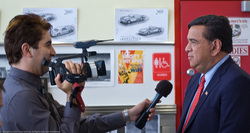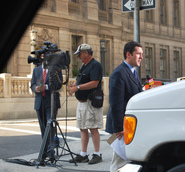 Media advisories are a well known tool to alert members of the media to an upcoming news event. It could be a press conference, an interview opportunity with an expert or a ribbon-cutting ceremony. Advisories are typically matter of fact -- who, what, when, where, etc. What you may not realize is that advisories that offer a short video can maximize your chances of generating interest. Here are just three reasons.
0 Comments
 Much of what passes as news these days is a recitation of events and what people say about them. In other words, a local fire causes heavy damage and a neighbor comments about the loss; the City Council passes an ordinance and a store owner comments on what it means to her; an elected official makes a speech and someone from the other party offers an opposing viewpoint. What reporters need While readers and listeners may benefit from comments like these, what's often missing in today's news cycle is good, effective and well reasoned interpretation of the news. Reporters are constantly on the lookout for effective thought leaders who can add a unique perspective on events or trends. The need is even more apparent when it comes to breaking news.  Chicago Tribune columnist Eric Zorn hits the nail on the head in a recent column about Chicago Congressman Jesse Jackson, Jr.'s mysterious illness. Zorn takes Jackson's office to task for mishandling the public communication of Jackson's condition or whereabouts. Zorn argues that, "The first rule of crisis management is that a trickle of bad news is worse than a sudden erruption." And he's right.  Are you in a rut when it comes to the words you use in a press release or statement? You may be and don't even realize it. Take this article about overused buzz words in press releases. A special website that analyzes press releases found that "leading" and "solution" were the words that were used most often. Other overused terms include "great," "unique" and "best." Sure, it's tempting to argue that those words may be just the right ones to convey your message. But, can't we at least try to be a little innovative? Sorry, "innovate" also ranked high on the list of overused words. The "solution" here is to at least recognize the problem. Then, you have a chance to overcome the problem. Being aware of the issue is half the battle. Then, stretch yourself. Take an extra moment to find something other than "dynamic" or "premier." It just might lead you in a new direction. For effective press releases and strategic thinking, contact us at [email protected].  It's easy to convince yourself of either of two realities: that everyone wants to cover your story or that no one wants to cover it. Both are probably wrong. In the first case, no matter how compelling you think your press release or event may be, chances are not every member of the media is convinced. News is like that. In the second case, no matter how many doubts you may have about the news value of your story, chances are at least one media outlet will be willing to report it. News is like that, too. So, stop talking yourself out of sending out a press release or advisory. You never know who will show up or call for a quote. What should you do? |
tags
All
Archives
March 2019
|
Photos from Meet the Media Guru, Joseph.Morris, BoldContent, MDGovpics, Grzegorz Łobiński, Mr Moss, North Charleston, ITU Pictures, wistechcolleges, .v1ctor Casale., www.audio-luci-store.it, katielips, editor64, NeighborLink Fort Wayne, AMagill, timsackton, MyFWCmedia, Matt J Newman, Mr.TinDC, Skley, mikecogh, othompsonski, wayne's eye view, Elvert Barnes, woodleywonderworks, North Charleston, MoBikeFed, flossyflotsam, North Charleston, NYCDOT, US Mission Geneva, jjandames, aalborgstift, BurnAway, A. Germain, North Charleston, NCDOTcommunications, IAEA Imagebank, The Chapman Cultural Center, hitsnooze, Wiertz Sébastien, charliekwalker, cliff1066™, TheeErin, woodleywonderworks, dane brian, Aramil Liadon, 2010 World Wheelchair Basketball Championships, Ty Nigh, freddthompson, Nadia Szopinska, west.m, stormwarning., Bright Meadow, Giorgio Montersino, Chris Erwin, Aplomb, jfingas, joce01_y, Massachusetts Dept. of Environmental Protection, Kevin Walter, Andrew Feinberg, Yan Arief, kellypretzer, Korean Resource Center 민족학교, veDro - l'Italia al futuro, crdotx, US Mission Geneva, Joe Shlabotnik, esocialmediashop, Stephen Cummings, CarbonNYC, sidewalk flying, MoBikeFed, marksdk, Marco Raaphorst, Saleel Velankar, adactio, edkohler, World Economic Forum, USACE Europe District, stereogab, Florin Rosoga, MikeSchinkel

